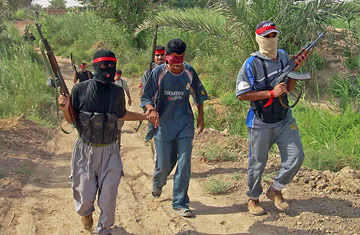
Local Sunni militiamen who decided to fight Al-Qaeda lead a blindfolded suspect whom they arrested during a raid in Um Al-Izam in the Diyala Province.
Col. Bryan Owens, the commander of U.S. forces in Salahuddin province, isn't hoping for the kind of tribal "awakening" seen in neighboring Anbar. In the desert reaches to the north of Owens' command, a number of tribal leaders have gathered themselves and their followers under the banner of Sunni chieftain Sheik Abdul Sittar, who has vowed to work with U.S. forces at crushing insurgents associated with al-Qaeda. The pact has brought some significant successes. The daily average of insurgent attacks in Anbar province has dropped by almost 50% in roughly a year, coming down to about 26 per day. Those gains have brought praise from military commanders in Iraq and even the White House. But Owens feels the strategy of putting tribes in the lead of fighting insurgents isn't the right approach for his area, where Sunni guerillas are stepping up their attacks even now.
"I think the tribal piece is a short-term fix," says Owens. "It's more important to develop the governmental pieces and the ties between the central government and the provincial."
The notable shift in the dynamics of Anbar province, which seemed lost to the insurgency as of late last year, has raised hopes that the same formula may make headway in Iraq's other troubled regions, especially Baghdad and Diyala province. But what's working in Anbar hasn't caught on nearly as much elsewhere and likely won't, at least not without the kind of negative repercussions that loom as a question mark over the Anbar enterprise.
For one, each province is different in terms of its mix of tribalism and sectarianism. In predominately Shi'ite southern Iraq, tribal authority is weak these days. Militia leaders like Moqtada al-Sadr and religious figures such as Grand Ayatollah Ali al-Sistani hold sway over sheiks. Diyala province is largely Sunni, like Anbar and Salahuddin, but not nearly as homogenous as those two western areas. And Baghdad, despite ferocious sectarian cleansing campaigns on both sides, remains a stronghold for both camps.
More importantly, Iraq's other provinces have at least some form of regional government in place, which Owens sees as the best solution.
"Here we have a provincial leadership," said Owens. "We have a provincial government that's functional. You don't want to have tribes fighting without the sanction of the government." Owens estimates that there are over 12,000 Iraqi police foot soldiers at work against insurgents in Salahuddin, which is home to the volatile city of Samarra. U.S. forces have encouraged tribal leaders to enlist their followers in existing security force. Short of that, tribes should stay out of the fight, as far as Owens is concerned.
"These are Iraqi security forces, so you don't want to undercut their ability to secure," Owens said. "What we don't want to do is go back to where the tribal piece here overrules the governance, because then we'll step back in time."
The strategy in Anbar was born of desperation and launched on the idea there was little to lose in a region where the insurgency's grip never fully loosened on cities in Anbar like Ramadi and Fallujah despite heavy fighting and high causalities by U.S. forces. "Right now there are no downsides to it," said Ambassador Lawrence Butler, who works on U.S. policy towards Iraq at the State Department in Washington. Butler said overall U.S. policy as of now aims to support the kind of tribal alliances U.S. forces have made in Anbar.
But the strategy has potential pitfalls that have kept military commanders like Owens and some policymakers leery. Sheik Sittar, the Sunni Chieftain, has vowed to work with the central government in Baghdad led by Iraqi Prime Minister Nouri al-Maliki, a Shi'ite partisan. But so far no meaningful cooperation between the two has emerged. And some fear that today's tribal alliances will become tomorrow's Sunni militias, bands of experienced and well-equipped fighters ready to attack Iraq's Shi'ite factions in a clash that could leave the country in open civil war.
Still, few seem willing to write off the experiment altogether, given the lack of alternative strategies in Iraq. Owens applies the approach in halting degrees, encouraging sheiks to organize tribal area watches to ward off insurgents. But at the same time Owens warns them not to venture far beyond their tribal homesteads with groups of armed men. In Baghdad, some tribal leaders are still actively working with U.S. military leaders to find a tribal solution to the violence still ripping at the capital every day.
"It could work in Baghdad if the Americans empower them equally," said Edham Fayadh al-A'amiree, the leader of a large tribe in the Baghdad area with both Sunni and Shi'ite followers. But he offers a warning to U.S. strategists dabbling in tribal politics: "They should be very careful and think of what the future will be like after they go."
